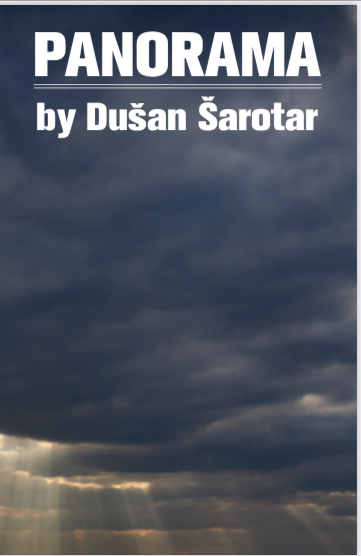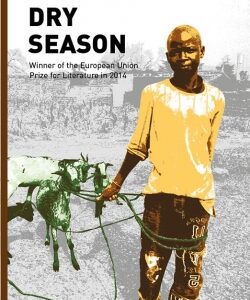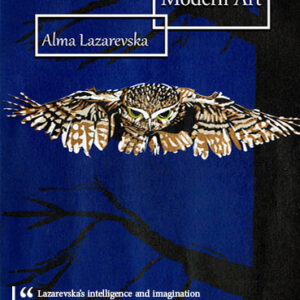POST TO UK & IRELAND ONLY
Author: Dušan Šarotar
Shortlisted for the Oxford-Weidendfeld Prize for Translation 2017
Nominated for the International Dublin Literary Award 2018
Deftly blending fiction, history and journalism, Dušan Šarotar takes the reader on a deeply reflective yet kaleidoscopic journey from northern to southern Europe. In a manner reminiscent of W.G. Sebald, he supplements his engrossing narrative with photographs, which help to blur the lines between fiction and journalism. The writer’s experience of landscape is bound up in a personal yet elusive search for self-discovery, as he and a diverse group of international fellow travellers relate in their distinctive and memorable voices their unique stories and common quest for somewhere they might call home.
Panorama is a title in the World Series by Peter Owen Publishers in association with Istros Books, bringing some of the best contemporary writing from Slovenia to English-speaking readers. The other titles in the Slovenian Autumn season are Three Loves, One Death by Evald Flisar and None Like Her by Jela Krečič.
CITATION FROM THE JUDGES OF THE OXFROD-WEIDENFELD PRIZE FOR TRANSLATION:
Panorama is an extraordinary, uncategorizable book, that is moving in its human dramas and ambitious in its cultural scope. It is also a topical novel of belonging and non-belonging, and of the different kinds of exile – national, linguistic, cultural – that lies at the heart of one strand of the European experience. ‘A narrative about the course of events’ is its subtitle, and it is indeed a rangy, poetic, journalistic, fictional melancholy book of travel in time, place and mind.
Patrick McGuiness – Author and Professor of Comparative Literature at the University of Oxford
“. . . the hydraulic ebb and flow of Panorama’s sentence waves subsumes the role of narration. . . Giving oneself to these meditative rhythms represents the true depth and joy of this novel—and it is a spiritual joy.”
Andrew Singer, World Literature Today
This is not a novel in which anything happens; it has all happened already, catastrophically, and the condition of exile is the only place from which one can achieve peace or perspective. This is what I think this marvellous book is telling us.
Nick Lezard, Guardian
… a meditation on loss and change … and on time, migration, language, ocean, love and war. It is densely compacted: its two hundred or so pages seem to expand much as a paper flower from childhood did when put in water. . .
Stephen Watts, poet and editor, from the Afterword
Some literature defies simple description. Case in point, Panorama, by Slovenian poet and writer Dušan Šarotar. One might be inclined to define it as a meditation within a travelogue within a novel. Or perhaps you would prefer to rearrange those terms, it probably wouldn’t matter, because in spite of its subtitle: A Narrative about the Course of Events, Panorama stands at a curious angle to space and time. It is a novel of remembering, of telling and retelling, narratives within narratives, bound together by a coarse thread of repeating themes that are at once timeless and timely.
—Joseph Schreiber, Numéro Cinq
‘…dense but rewarding series of WGSebald-like meditations on ideas of belonging…’
David Mills, Sunday Times
‘This book is about a lot of things. Like all good novels, it is about language…It is also about exile and identity and belonging (and not belonging). Of course, it is also about war and death and the terrible upheaval that war causes. It is abut the dark side of life, for there is always a dark side. But is also about friendship and remembrance and learning about the world.’
‘But while Šarotar (and his narrator) serve as the mouthpiece for the various emigres who show up in Panorama, Šarotar, who still lives in Slovenia and writes in Slovene, does not seem to share the emigres’ preoccupation with the loss of their birth languages. His ultimate goal is an attempt to capture in a grand, sweeping gesture of language the ineffable sense of being alive, of finding oneself human on a strange planet. It’s both a search for personal understanding and an attempt to test the limits of language.’
Terry Pitts, Vertigo
But while Šarotar (and his narrator) serve as the mouthpiece for the various emigres who show up in Panorama, Šarotar, who still lives in Slovenia and writes in Slovene, does not seem to share the emigres’ preoccupation with the loss of their birth languages. His ultimate goal is an attempt to capture in a grand, sweeping gesture of language the ineffable sense of being alive, of finding oneself human on a strange planet. It’s both a search for personal understanding and an attempt to test the limits of language.






